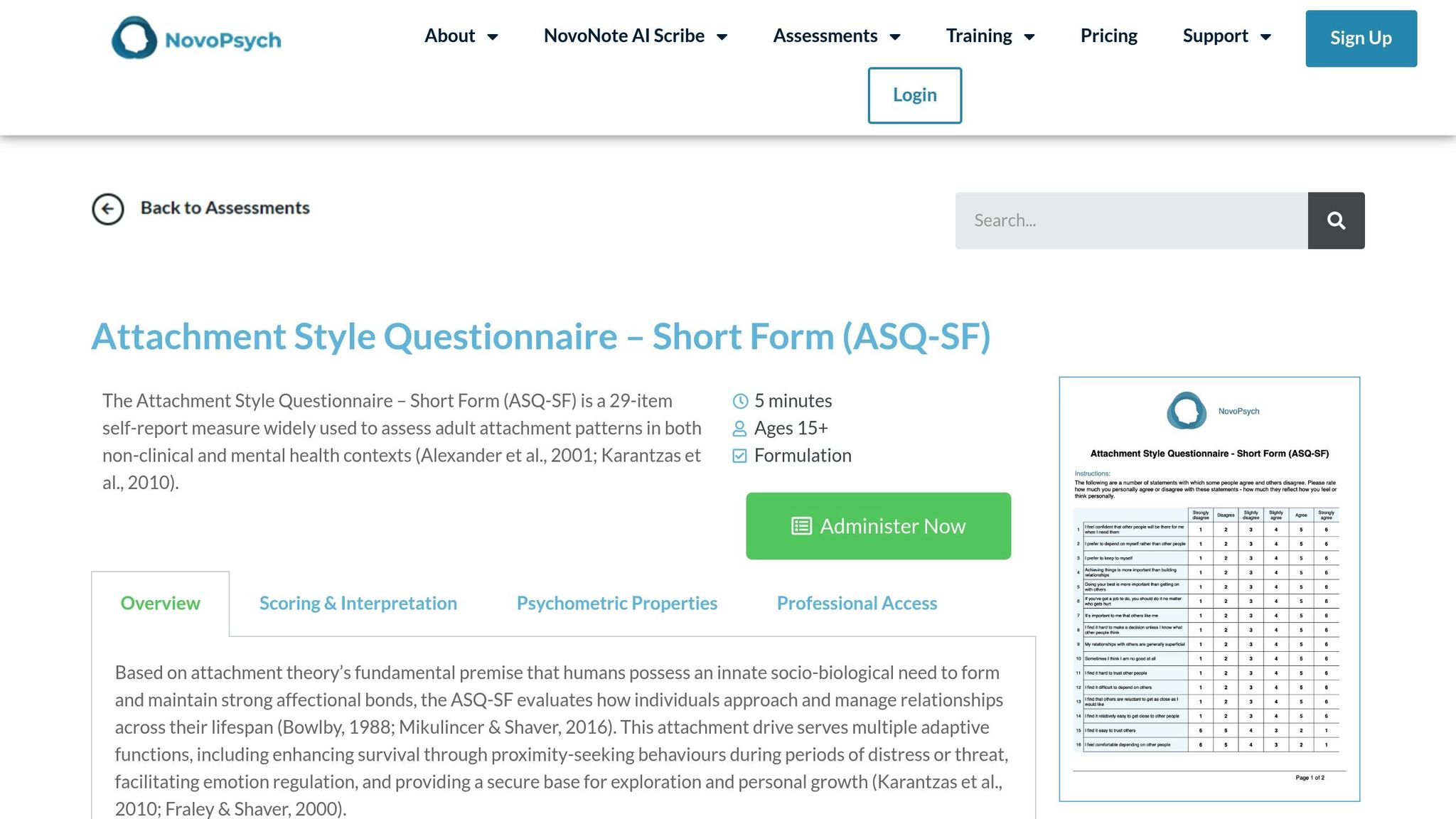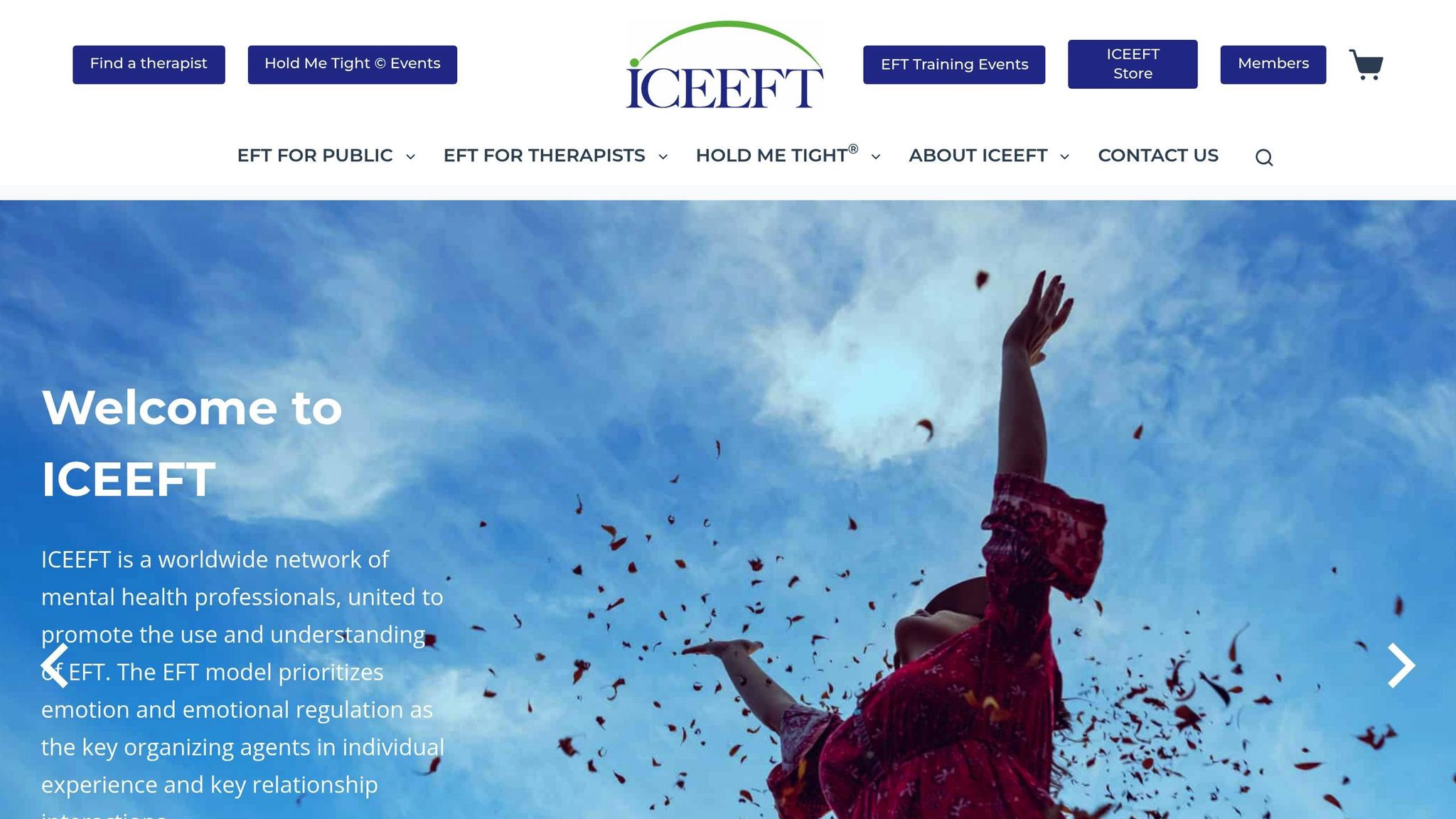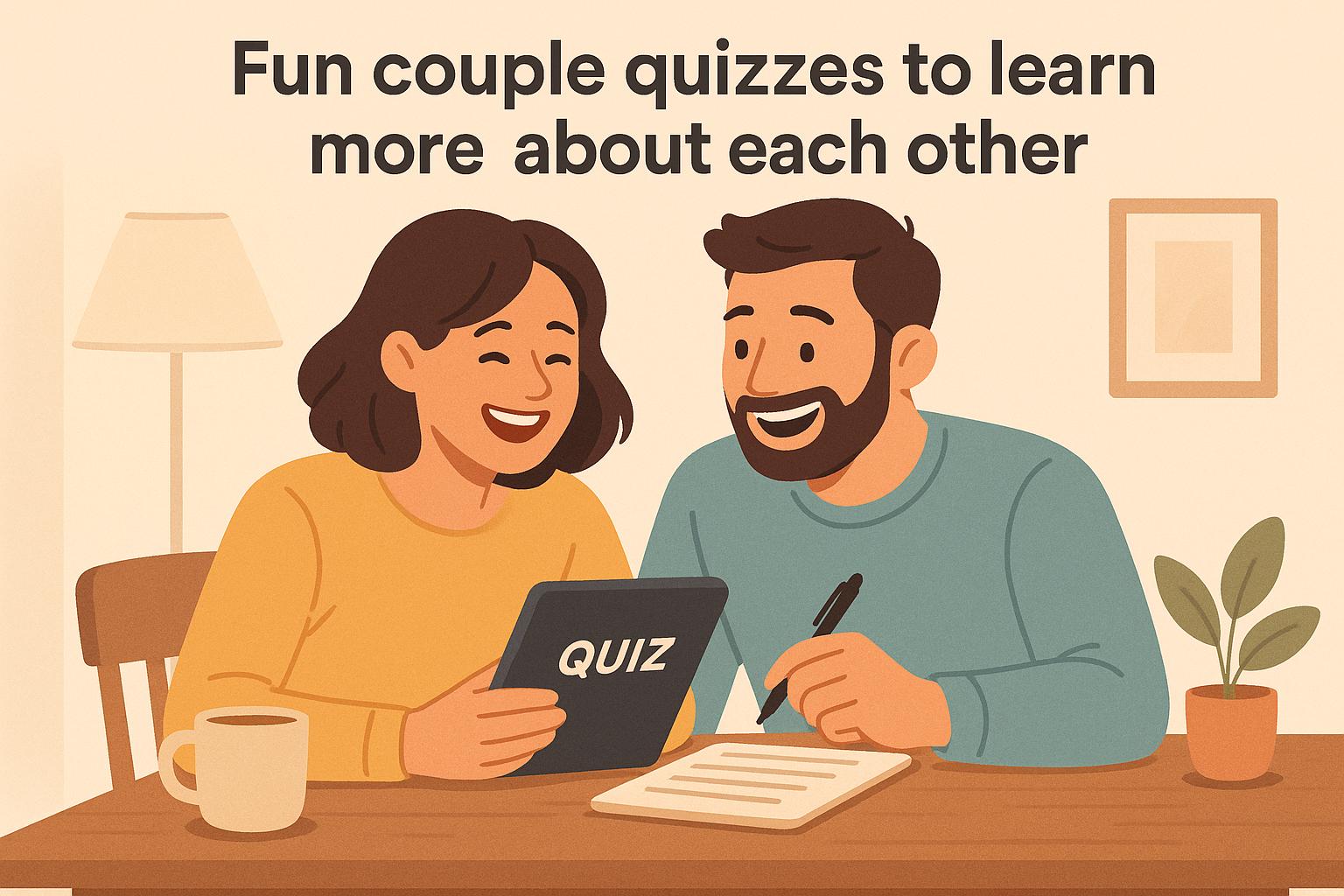Want to strengthen your relationship? These 5 science-backed quizzes can help you and your partner connect on a deeper level. From understanding love languages to improving communication during conflicts, these tools are designed to foster meaningful conversations and emotional growth.
Key Highlights:
- Love Languages® Assessment: Discover how you and your partner express and receive love in 5 unique ways.
- Adult Attachment Style Questionnaire: Explore attachment patterns that influence your emotional connection.
- EFT Relationship Quiz: Identify emotional disconnects and build a secure bond using the A.R.E. framework.
- Conflict Resolution Assessment: Learn healthier ways to handle disagreements and improve communication.
- Gottman Love Maps Quiz: Deepen emotional intimacy by understanding your partner’s inner world.
Quick Comparison Table:
| Quiz | Purpose | Research Basis | Time Needed | Best For |
|---|---|---|---|---|
| Love Languages® Assessment | Understand how to give/receive love | Based on counseling insights | 5–10 minutes | Couples improving affection and connection |
| Attachment Style Quiz | Explore emotional attachment tendencies | Grounded in attachment theory | 10–15 minutes | Building secure emotional bonds |
| EFT Quiz | Spot negative cycles and improve connection | Based on Emotionally-Focused Therapy (EFT) | 5–8 minutes | Resolving recurring conflicts |
| Conflict Quiz | Assess and improve conflict management | Informed by conflict resolution research | 8–12 minutes | Handling arguments effectively |
| Love Maps Quiz | Deepen emotional intimacy and friendship | Backed by Gottman Institute research | 10–15 minutes | Strengthening emotional connection |
Start with one quiz, discuss your results, and take small steps to build a stronger relationship. These quizzes are tools to spark conversations and create lasting improvements in how you connect with your partner.
1. The Love Languages® Assessment
Dr. Gary Chapman, a seasoned marriage counselor, introduced The Love Languages® Assessment, which has become one of the most widely recognized relationship tools today. With over 30 million people taking its online quiz, it’s clear this concept resonates with many.
Purpose of the Quiz
The quiz is designed to pinpoint your primary way of expressing and receiving love, categorized into five key "languages": words of affirmation, quality time, physical touch, acts of service, and receiving gifts. It not only highlights your unique way of communicating love but also opens the door to meaningful conversations about how you and your partner connect. By understanding each other’s love language, couples can set clearer expectations and avoid misunderstandings.
"One of the most significant indicators of a successful relationship is your ability to connect with your partner on multiple levels. If you are trying to express love in a language that your partner doesn't relate to, it will be no surprise that there will be dis-connect." - Dr. Gary Chapman
Scientific Basis and Research Backing
Though the Love Languages® concept has gained immense popularity, its scientific roots are less straightforward. Dr. Chapman developed his theory based on personal experiences and anecdotes from his counseling practice, rather than through rigorous, peer-reviewed research. To date, there are no published studies affirming the reliability or validity of the Love Languages Quiz™.
Research findings on the effectiveness of aligning love languages have been mixed. For example, some studies suggest that over half of participants don’t have a single definitive love language. A 2017 study indicated that expressing love in ways a partner values can enhance relationships, but this doesn’t always align with one of the five specific love languages.
"Despite their popularity, love languages have not been validated by rigorous research. Chapman's framework is based on personal observations and anecdotes rather than empirical studies." - Shannon Sauer-Zavala, Ph.D., Clinical Psychologist
Other research highlights that emotional responsiveness, trust, and open communication are stronger predictors of relationship success than simply matching love languages.
Actionable Insights for Couples
Even with its limited scientific backing, the Love Languages® Assessment can still be a powerful tool for improving communication. Couples can use it as a starting point to better understand each other. Take the quiz individually, then find time to discuss the results together in a calm, distraction-free setting. Rather than treating the results as rigid rules, view them as a way to gain awareness of each other’s preferences.
"Real love is figuring out how someone wants to be loved and loving them in that way." - Jay Shetty
Make an effort to learn your partner’s love language and find small, consistent ways to express love in the way they value most. Regular check-ins are also key - ask your partner what makes them feel appreciated and loved, as these needs can change over time.
It’s important to approach the love languages concept with flexibility. While it can expand your options for showing intimacy, it should never be used as a tool for control or manipulation. Ultimately, the assessment works best when both partners embrace the idea that loving someone involves meeting them where they are - not just where it’s convenient for you.
2. Adult Attachment Style Questionnaire

The Adult Attachment Style Questionnaire – Short Form (ASQ-SF) is a trusted self-report tool designed to explore adult attachment patterns. Built on decades of research, this 29-item questionnaire takes just about 5 minutes to complete. It evaluates attachment behaviors along two key dimensions: attachment-related anxiety and avoidance.
Much like the Love Languages® Assessment, the ASQ-SF encourages meaningful discussions about how each partner connects emotionally.
Purpose of the Quiz
The ASQ-SF is all about helping individuals uncover their attachment tendencies - the ingrained ways they navigate relationships. It doesn’t box people into rigid categories but instead provides a more flexible understanding, offering valuable insights even for those with minimal relationship experience. This understanding can help couples address communication challenges and strengthen emotional bonds.
Scientific Basis and Research Backing
The ASQ-SF is grounded in attachment theory developed by John Bowlby and Mary Ainsworth. It builds on Feeney et al.'s model, using a continuous scale to capture attachment patterns rather than assigning fixed categories. Research using the ASQ has uncovered some interesting trends: for instance, singles often report greater discomfort with closeness and are more likely to view relationships as secondary compared to those in stable, committed partnerships.
Studies have also shown that dimensional tools like the ASQ-SF are more effective than categorical models at capturing the nuances of individual attachment differences.
Actionable Insights for Couples
Understanding your attachment style can bring a fresh perspective to your relationship. For example:
- Secure attachment: These couples excel in open communication and mutual support.
- Anxious attachment: Partners may need to balance seeking reassurance with building self-confidence.
- Avoidant attachment: Practicing vulnerability and appreciating emotional connection can make a big difference.
- Disorganized attachment: Couples can focus on identifying emotional triggers and creating more consistent interactions.
The ASQ-SF is a powerful tool for couples therapy, helping partners pinpoint attachment-related challenges. By addressing these, couples can improve communication and deepen emotional intimacy.
3. Emotionally-Focused Therapy (EFT) Relationship Quiz

The Emotionally-Focused Therapy (EFT) Relationship Quiz is designed to evaluate the emotional connection between partners. It focuses on three key aspects of relationship security - accessibility, responsiveness, and engagement. These elements help determine whether couples have established what Dr. Sue Johnson calls a "secure base" during difficult times.
Purpose of the Quiz
This quiz acts as a diagnostic tool, helping couples identify and understand negative interaction patterns that weaken their bond. By addressing questions like, "Are you there for me? Do I matter to you? Will you come when needed?", the quiz highlights areas where emotional support may be lacking. This insight is especially helpful for couples who find themselves stuck in cycles where one partner withdraws and the other pursues, creating a loop of disconnection.
Scientific Basis and Research Backing
The EFT Relationship Quiz is rooted in attachment theory, which underscores the importance of secure emotional connections for personal well-being and healthy relationships. EFT has been extensively studied and is recognized as one of the most effective forms of couples therapy. Research shows that couples often see positive results within 8–20 sessions, and a 2019 systematic review confirmed its ability to improve marital satisfaction and reduce relationship stress.
Dr. Sue Johnson highlights the critical role of emotional responsiveness in love:
"Emotional responsiveness - tuning into and supporting the other - is the key defining element of love".
Feeling disconnected from a partner can trigger a primal sense of panic. As Dr. Johnson explains:
"Isolation and the potential loss of loving connection is coded by the brain into primal panic response... Distressed partners may use different words but they are always asking the same basic questions: 'Are you there for me? Do I matter to you? Will you come when I need you, when I call?' Love is the best survival mechanism there is, and to feel suddenly cut off from a partner, disconnected, is terrifying".
Actionable Insights for Couples
The EFT Relationship Quiz doesn't just diagnose issues - it also offers couples tools to break negative cycles and build stronger emotional connections. Through the A.R.E. framework (Accessibility, Responsiveness, Engagement), couples can learn to:
- Be emotionally available during times of need
- Respond with empathy and understanding
- Stay engaged, even in difficult conversations
Dr. Sue Johnson emphasizes the importance of vulnerability in creating deeper bonds:
"In insecure relationships, we disguise our vulnerabilities so our partner never really sees us". The quiz helps couples uncover these hidden emotional barriers and provides a path toward genuine connection.
Practical steps include addressing emotional needs instead of surface-level problems, acknowledging how actions impact the other person, and committing to open communication. Dr. Johnson beautifully sums up the goal of this approach:
"Love has an immense ability to help heal the devastating wounds that life sometimes deals us. Love also enhances our sense of connection to the larger world. Loving responsiveness is the foundation of a truly compassionate, civilized society".
4. Conflict Resolution Assessment
The Conflict Resolution Assessment takes a closer look at how couples navigate disagreements by analyzing communication styles, emotional triggers, and conflict-handling strategies. Unlike tools that focus on compatibility or attachment styles, this assessment zeroes in on how conflicts are managed, turning potential relationship hurdles into opportunities for growth.
Purpose of the Quiz
This assessment acts as a practical tool for couples aiming to understand their individual and shared approaches to conflict. It identifies whether partners tend toward avoidance, aggression, compromise, or collaboration during disagreements and pinpoints emotional triggers that can escalate even small issues. As clinical psychologist Russell Grieger puts it:
"All couples have disagreements. It is impossible to avoid them. It is how they handle them that will make or break their relationship."
By highlighting unhealthy dynamics like win-lose or lose-lose approaches, the assessment encourages couples to adopt a win-win mindset, fostering healthier interactions.
Scientific Basis and Research Backing
The assessment draws on years of research in organizational psychology and relationship science. Its foundation includes influential frameworks developed at Columbia University, which outline five primary conflict management strategies across power dynamics. It also incorporates principles from Yoesoep Edhie Rachmad's 2022 Conflict Resolution Theory, which emphasizes the importance of communication, understanding, and cooperation for sustainable conflict resolution.
Richard Slatcher, director of the Close Relationships Laboratory at the University of Georgia, underscores a common misstep in conflict resolution:
"We often have the instinct to try to win disagreements, and that's a mistake that many couples make. Instead, they should be arguing for the relationship to win."
Research consistently shows that when conflicts are handled constructively, they can deepen understanding, enhance communication, and even foster personal growth.
Actionable Insights for Couples
The Conflict Resolution Assessment provides practical strategies to help couples improve how they handle disagreements. It focuses on four key areas:
- Communication: Use "I feel" statements, address one issue at a time, and practice active listening.
- Emotional Regulation: Recognize triggers, assume good intentions, and learn to separate major concerns from minor annoyances.
- Problem-Solving: Work through emotional reactions, focus on win-win solutions, and brainstorm resolutions that satisfy both partners.
- Maintenance: Schedule regular check-ins to address concerns early and maintain intimacy.
These strategies aim to transform conflict into a tool for building stronger, more resilient relationships.
sbb-itb-3793826
5. Gottman Love Maps Quiz
The Gottman Love Maps Quiz shifts the focus from conflict to connection, diving into how well couples truly understand the details of each other's lives. It’s rooted in the idea that emotionally connected couples maintain detailed mental "maps" of what’s most important to their partner.
Purpose of the Quiz
This quiz challenges couples to reflect on how deeply they know one another. Love Maps represent the mental space where you store essential details about your partner’s world - like their dreams, fears, and favorite memories. It’s less about surface-level knowledge and more about truly grasping what makes your partner tick.
Dr. John Gottman explains it best:
"Emotionally intelligent couples are intimately familiar with each other's world... These couples have made plenty of cognitive room for their marriage and their spouse. They remember the major events in each other's history, and they keep updating their information as their spouse's world changes."
By identifying areas where your understanding might be incomplete, the quiz acts as a guide to strengthen emotional intimacy and build a more profound friendship.
Scientific Basis and Research Backing
The Gottman Institute’s research highlights the importance of Love Maps in fostering lasting relationships. Couples with detailed Love Maps are 90% more likely to stay happily married. This is because feeling truly understood releases oxytocin, a hormone that deepens trust and closeness. Additionally, studies show that friendship forms the foundation for 70% of satisfaction in areas like sex, romance, and passion.
One notable finding is how Love Maps influence couples after major life changes. For example, after the birth of their first child, 67% of couples reported a decline in marital satisfaction. However, the remaining 33% either maintained or improved their relationship satisfaction - a difference attributed to the strength of their Love Maps.
Dr. Julie Gottman emphasizes the ongoing nature of this process:
"Love Maps are a lifetime project. The more you know about your partner, the more you can fall in love with them over and over again."
Actionable Insights for Couples
The Love Maps Quiz isn’t just about identifying gaps - it’s about giving couples tools to grow closer. Here are a few ways to deepen your connection:
- Ask open-ended questions to explore your partner’s dreams, fears, and personal history. Listen actively and show genuine curiosity.
- Stay engaged with your partner’s evolving goals, stresses, and interests by having regular, meaningful conversations.
- Delve into the "dreams within conflict" by uncovering the hopes and motivations that often lie beneath disagreements.
Quiz Comparison Chart
Here's a quick look at various relationship quizzes, their goals, research foundations, time commitments, and which couples might benefit most from them:
| Quiz | Primary Purpose | Research Background | Time Required | Best Fit For |
|---|---|---|---|---|
| Love Languages® Assessment | Discover how you and your partner express and receive love | Based on Dr. Gary Chapman's counseling insights and clinical observations | 5–10 minutes (31 questions) | Couples wanting to enhance how they show affection and feel valued |
| Adult Attachment Style Questionnaire | Explore attachment patterns influencing emotions and behaviors | Grounded in attachment theory by Bowlby and Ainsworth | 10–15 minutes (43 questions) | Partners aiming to create secure bonds and understand emotional dynamics |
| Emotionally-Focused Therapy (EFT) Relationship Quiz | Pinpoint negative cycles and recurring relationship patterns | Based on Dr. Sue Johnson's EFT principles | 5–8 minutes (13 questions) | Couples dealing with repeated conflicts or communication issues |
| Conflict Resolution Assessment | Assess how couples manage disagreements and stress | Informed by decades of research and therapeutic practices | 8–12 minutes | Partners seeking healthier ways to handle arguments or reduce tension |
| Gottman Love Maps Quiz | Gauge how well partners know each other's inner worlds | Built on Dr. John Gottman's 40+ years of relationship research | 10–15 minutes | Couples wanting to deepen emotional intimacy and friendship |
For couples struggling with ongoing issues, the EFT quiz and Conflict Resolution Assessment can help identify and address negative patterns. Meanwhile, the Gottman Love Maps Quiz is a great tool for any stage of a relationship, especially for partners who feel emotionally disconnected.
Conclusion
These five science-backed relationship quizzes offer couples practical tools to strengthen their bond. Think of them as regular check-ins for your relationship - helping you spot what’s working well and addressing small issues before they grow into larger challenges.
What matters most is how you use these insights to spark meaningful conversations. Therapist Ivy Kwong emphasizes this beautifully: "Healthy romantic relationships don't just happen, they are created with mutual care, effort, and intention. By communicating openly and vulnerably, demonstrating care and consideration for each other, and being willing to adapt to changes and work through challenges together, your love relationship can grow and thrive". In other words, the real power lies in turning knowledge into action.
Take some quiet time to discuss your quiz results and use them as a springboard for deeper conversations. As the Gottman Institute wisely notes, "The real magic happens when you don't just understand our concepts, but actively apply them to everyday life - turning insights into action". These discussions can lead to small, meaningful changes that make a big difference.
Set SMART goals based on your results. Whether it’s practicing active listening, showing love in ways your partner values most, or improving how you handle disagreements, small, consistent steps can lead to lasting improvements.
Research shows that understanding your partner is key to a fulfilling relationship. These quizzes aren’t the final word - they’re stepping stones for ongoing growth. By approaching them with intention and using them as tools for reflection, you can build a relationship that evolves and thrives over time.
FAQs
How can understanding my partner's love language help our relationship, even if it isn’t fully backed by science?
Understanding your partner's love language can be a game-changer for your relationship. It’s all about improving communication and deepening your emotional bond by expressing love in ways that truly resonate with your partner. While this idea may not be backed by extensive scientific research, many couples find it to be a practical and meaningful approach.
By focusing on love languages, you open the door to conversations about each other's emotional needs and preferences - conversations that are key to building a strong, healthy relationship. Even without a mountain of scientific evidence, this concept often serves as a helpful way to nurture appreciation, intimacy, and mutual understanding with your partner.
What can couples do to strengthen their relationship after learning their attachment styles?
Couples who understand their attachment styles can take meaningful steps to strengthen their relationship. Start by having an open, honest conversation about how these styles impact your emotions and behaviors. This kind of dialogue can pave the way for greater understanding and empathy between partners.
Make it a priority to practice active listening - really hearing each other out without interrupting - and validate each other's feelings. This helps build a stronger emotional connection. Additionally, work on establishing healthy boundaries and use clear, non-confrontational communication to manage any conflicts that may arise.
For more complex challenges, couples therapy can be a valuable resource. A therapist can help you explore attachment dynamics and guide you toward healthier ways of interacting. These efforts can lead to a more secure and satisfying relationship.
How can the Conflict Resolution Assessment help couples grow closer through disagreements?
The Conflict Resolution Assessment is designed to help couples recognize their specific conflict styles and how these influence their communication. By pinpointing patterns and identifying areas where they can improve, couples gain the tools to handle disagreements with greater empathy and mutual respect.
This assessment turns conflicts into chances to grow, offering practical strategies for managing difficult conversations. As couples refine their approach to resolving disagreements, they can deepen emotional connections and enhance the overall strength of their relationship.

